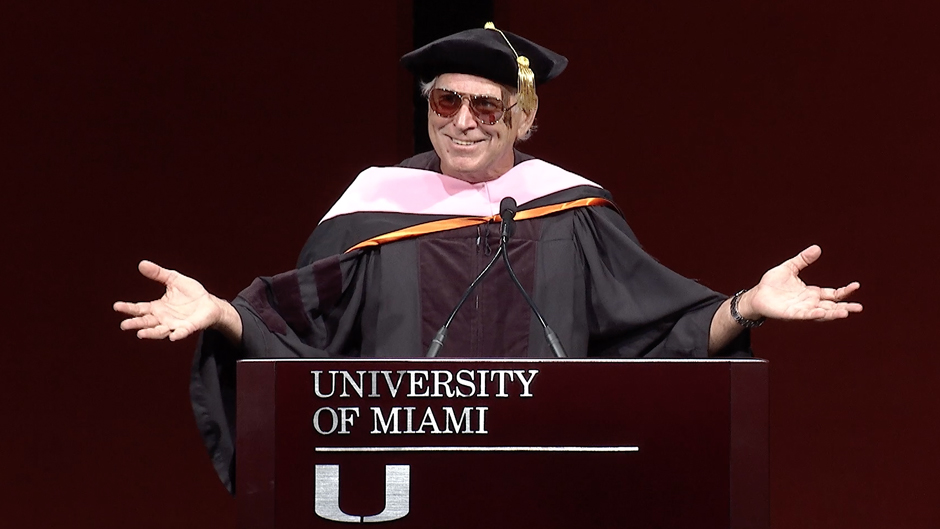Jimmy Buffett visited the University of Miami in May 2015 to receive an honorary degree “for his enduring impact on American culture as a gifted musician and storyteller,” and to offer a commencement address.
On stage for the occasion, the legendary singer-songwriter, who by then had produced more than 40 albums, most of them gold, platinum, or multi-platinum, wore flip-flop sandals and described his regalia gown as “a Mardi Gras costume with a purpose.”
“South Florida has been on my song line for a long, long time,” Buffett told the graduates in recounting his first trip to Miami. As a youngster, he had traveled with his parents and sisters from southern Alabama for a vacation. Their visit to the Miami Seaquarium left an indelible impression.
Watching Flipper perform, Buffett said, ignited a dream to become a dolphin trainer and he imagined pursuing a major in marine biology at the University and to become a “Jacques Cousteau with a Southern accent.”
“But that didn’t work out,” Buffett laughed. The closest he came to becoming a Hurricane was performing one winter in 1971 at the bar venue that is today the Titanic Brewery, located on the edge of campus.
“I started out as a bar singer in Coral Gables, and now I’ve got a doctorate degree,” Buffett joked. “You have to love that kind of evolutionary process.”
Buffett, who in addition to his musical celebrity created a hugely successful branding and business empire, indeed enjoyed an extraordinary evolutionary process.
Tabbed by Rolling Stone as “rock’s romantic poet-pirate,” Buffett died Friday, Sept. 1 at the age of 76. According to media reports, his website and social media accounts listed he had been battling Merkel cell skin cancer for four years. He had been hospitalized earlier this year.
Shelly Berg, dean of the Frost School of Music, knew Buffett both as a friend and fellow musician.
“Jimmy Buffett created his own genre of island rock [a combination of calypso, rock, folk, country, and pop], arising out of his lived experience and keen sense of humanity,” Berg said. “The folksiness of his music didn’t fully reveal the brilliance of the man behind it. “
Berg recounted that a decade ago, Buffett gave a talk to students at the Frost School of Music.
“One student asked Jimmy how he kept ‘Margaritaville’ fresh after thousands of performances. Jimmy replied, ‘When the music escapes my lips it doesn’t belong to me anymore, it belongs to the audience,’” Berg remembered. “Jimmy Buffett belongs to all of us, and we will miss him.”
Reynaldo Sanchez, professor and associate dean for Strategic Initiatives and Innovation at Frost, said Buffett was a big influence on him as a songwriter.
“I will always admire his skill as a wordsmith and uncanny knack for infectious melodies,” Sanchez said. “In the late 1990s, I had the honor of working with Jimmy as an arranger on his musical, ‘Don't Stop The Carnival,’ and it was a front-row seat to his writing process, getting to see multiple revisions of his songs, each one better than the one before. He was a joy to work with on every level."
Sanchez reconnected with Buffett years later during his visit to the Frost School.
“His generous interaction with our students was candid, honest, and inspiring,” Sanchez remembered. “Jimmy's passion for life and effervescent joy in music-making are the legacy we'd want all our students to embrace.”
Born James William Buffett in Pascagoula, Mississippi, on Christmas Day 1946, Buffett grew up mostly in Alabama and was close to his grandfather, a sea captain whose tales of the high seas triggered Buffett’s lifelong passion for the water.
As a teenager, he attended parochial schools in Mobile, Alabama, and began playing guitar in 1964 while a member of a fraternity house on the Montgomery campus of Auburn University. On weekends, he traveled to New Orleans, Louisiana, and Biloxi, Mississippi, to play in bars and on street corners.
In 1969, he earned a journalism degree from the University of Southern Mississippi, then headed for Nashville hoping for a recording career that never took off. He ended up in Miami.
As part of his commencement address, Buffett honored his friend Jerry Jeff Walker, “who took me in when I came to town [Coconut Grove] and really had nothing.”
One day Walker, he said, convinced him to hop aboard his 1947 Packard and drive to Key West. They arrived in time for sunset and to watch the daily ritual of hippies free-dancing on the beach to conga drums.
The scene showed Buffett that the Keys and island life would be home for endlessly fertile ground for songwriting material. And it was for some 20 years.
Buffett thrived on the beach-bum stage persona he cultivated as a musician, but he was likewise a savvy businessman with a voracious commercial appetite and a restless creative drive that prompted him to write both best-selling adult and children’s books. Forbes recently estimated his worth at $550 million, and he owned boats, planes, and properties across the country, according to media reports.
This past summer, researchers with the Rosenstiel School of Marine, Atmospheric, and Earth Science and the Water Research Group from the Unit for Environmental Sciences and Management at the North-West University in South Africa discovered the first new gnathiid isopod from the Floridian ecoregion in 100 years.
“By naming a species after an artist, we want to promote the integration of the arts and sciences,” said Paul Sikkel, a research professor in the Department of Marine Biology and Ecology at the Rosenstiel School.

